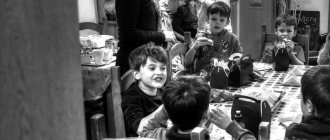“Professionals work in the kindergarten; they will teach him everything. We pay money, after all!” - this is how many parents argue, and then they are surprised that all the mothers and fathers of the group are up in arms against their child. The baby is uncontrollable, he bites and is rude, takes away toys and food, and the question arises about his mental state. But the reason may be less terrible and more banal: the child simply was not taught how to behave in a group. You can and should rely on educators, but you shouldn’t make a mistake yourself. It is important to instill good manners in your child from the first years of life and learn etiquette together. Then you won’t have to blush in front of kindergarten workers or other parents. To teach your child quickly, refer to this simple list of rules that apply in all kindergartens in Russia.
Communication with adults
Rules of behavior for children in kindergarten begin with the norms of proper communication. The child is afraid of new adults and is embarrassed, so it’s worth explaining to him how to behave with his uncles and aunts so that everything is fine:
- All employees must be called by their first name or patronymic or addressed as “You”. Make sure that your child learns the teacher’s first and last name. Addressing the form disciplines him. To do this, do not deviate from the rules and repeat the full name yourself, and not an abbreviation or nickname.
- When meeting, you need to say hello and, if necessary, ask permission. If you need to go out, find out something, complain about something, it is important to first clarify whether this can be done. Before you leave, you need to ask permission and say goodbye. These basic rules will help maintain the child’s safety and raise his social rating in the eyes of educators.
- You cannot interrupt an adult or raise your voice at him. The child must learn discipline, otherwise there will definitely be problems at school.
- If a child is hit, bitten, offended, or witnesses the escape (kidnapping, fainting, seizure) of another child, he must immediately complain to the teacher, but calmly and quietly state all the facts, without shouting or insulting the offenders.
- You cannot touch adults, much less beat them. It is important to maintain a boundary between yourself and the teacher.
It is important to learn that the teacher must be obeyed, because the child cannot yet be responsible for himself and his actions. He must follow orders and not react aggressively to criticism. If the child feels that the teacher treated him unfairly, he should tell his parents about the situation, they will sort it out. But you can’t take revenge yourself and become hysterical. You must remain calm in public places.
Methods for establishing discipline
To begin with, you should work on yourself, building a line of behavior in order to establish authority. The style of communication with children presupposes strictness in matters of principle, affection in all situations and kindness, humor, but without sarcasm, tact, but frankness, and responsiveness. The main thing is a sincere interest in the personality of each child. There are no bad children, there are unfortunate ones...
The ultimate goal of the teacher is to arouse interest in himself, a desire to communicate on the part of children, obey orders with pleasure, readiness to fulfill a request, earn approval, a gentle look, a word, a gesture. Your stern look and word when discipline is violated should not cause anger, resentment, dissatisfaction, but shame for your actions and the desire to immediately correct the situation.
In your situation, colleague, leaders need to be organized and led. Such guys are really looking forward to recognition of their leadership qualities, so delegate authority to leaders and entrust them with discipline duty. I think it’s worth having a conversation with the group on the topic of what is bad and good, together define and write the rules by setting up a special stand, where there are also photos of children and daily marks on behavior in the form of stars of three colors.
Red – bad, yellow – normal, green – excellent. Every day, do not forget to give ratings together with the children, let them determine which star they deserve. Don't forget about incentives and advances. If a child is too deeply offended by well-deserved red stars, reward him with yellow or even green, but explain your decision to all children. Don't allow injustice!
And to attract attention and eradicate outbreaks of disobedience during classes, there is the following technique: bell, tambourine, whistle, pipe. Announce that you will check who is the most attentive and, at the signal of a whistle or tambourine, will fall silent and look at the teacher. Train constantly until the reflex is developed.
You can complicate the task: as soon as the signal sounds, everyone stops and repeats the movements of finger gymnastics or just exercises after the teacher. The bell rings: everyone watches and repeats who is great and deserves praise or a star. And so on every day until you reach automaticity. Warn children that you will signal unexpectedly.
Communication with children
This is the most important point of the rules of conduct for children in kindergarten. If your baby does not behave as expected, you may have serious problems. Many parents react very violently to the slightest offense inflicted on their child. They can seriously spoil not only your mood. So teach your child caution, tolerance and common sense when interacting with children:
- You cannot beat, insult, or touch other children, even if they allow themselves to do so. In response to beatings and curses, you need to complain to your parents and teachers, and no longer communicate with the aggressor. It is better not to approach cruel children at all.
- You cannot boast about your financial situation and humiliate other children with hints about their poverty. The child himself has not yet earned anything, and in this sense all children are equal.
- You can’t spoil other people’s things and allow them to break your own. If other children break a toy, it is important to complain to parents and teachers in order to avoid a conflict.
- You cannot take other people's things for yourself, either secretly or openly. If you really want a toy, you need to ask your mother for it, and not take it from others. You cannot even accept a toy as a gift, as this may cause indignation among parents who bought this item for their child and do not intend to lose it.
- You cannot interrupt, shut up, or discuss other children behind their backs. A polite person will always listen to others and will not impose his opinion if they do not want to listen to him. It is also important not to occupy the airwaves with your person. Many children talk a lot and do not allow a word to get in, and therefore very soon they are left without listeners and worry, not understanding why this happened.
Any conflict situations are resolved by the teacher; he is an arbiter and judge.
Don’t be shy about complaining, because timely intervention will prevent a fight. If a child does something that is forbidden, imitating bad examples, this should also be reported to the teacher. Only he can call the parents and notify them about the problem that has arisen.
Parents themselves must set a good example. There is no need to sort things out with children who have done wrong. This is not your job, you have no right to scold and shame them. You can express your indignation in a calm manner to the teacher and parent if the problem is serious. But there is no need to throw a tantrum, especially in front of children. Fights and other antics will only worsen the situation and force you to look for another kindergarten. But you are neighbors, why should you quarrel?
Other techniques to stop negative manifestations
In case of isolated manifestations of violations of discipline during important security moments, the following measures can be taken against the “troublemaker,” especially if the child’s actions are, to put it mildly, inadequate:
- Ignoring or minimal attention to the offender;
- Focused gaze into the child's eyes without anger or condemnation, calmly but intently, as if we were stopping with our gaze;
- Addressing the child in a specially intoned voice: in some special tone we say something like “Look at me, please,” in a lowered, changed voice;
- We abruptly stop any activity and say: “We’ll wait until Petya can join us”;
- A non-standard question or gesture (affectionate) that will distract the child;
- Voicing his state: “You hate me, you are very angry with Petya, you are tired and angry”;
- Praise often stops you: “You kick your legs so beautifully, how do you do it?”, but without mockery, in a friendly way, without laughter;
- You can sit on a chair to think, but not in a corner.
In principle, these methods and techniques should be enough; at the end of the article I would like to share some tips on good teaching aids:
- “Planning the organized educational activities of a teacher with children of the preparatory group: technological maps for every day according to the program “From birth to school”, ed. N. E. Veraksy, T. S. Komarova, M. A. Vasilyeva. December-February";
- “Organization of children’s activities during a walk. Preparatory group";
- “How to help an autistic child. A book for parents. Toolkit";
- “Special offer to top up your personal account + participation in the offline webinar “How to organize the work activity of a preschooler?”
I really hope that my young colleague will take advantage of the ideas I proposed and be able to cope with negative manifestations in the children's team. If you find my article interesting, share it with your friends, and if you want to constantly read the materials, subscribe to the news.
Sincerely, Tatyana Sukhikh! Till tomorrow!
By the way, I recommend reading:
Table etiquette
During meals, the upbringing of a child is most evident. Cultured children eat carefully, do not criticize food, do not spit, or disturb others. Therefore, it is very important to leave all table games at home. Yes, and there they are inappropriate, to be honest.
- You should not talk with your mouth full, play with food or bite too large pieces (this is very dangerous). You could choke or stain your neighbor, furniture, and yourself.
- You cannot put your elbows on the table, swing on a chair, or swing your arms and legs during a meal. All games are after meals.
- Drinks should be drunk in small sips, main courses should be eaten with a fork, and soup with a spoon. This is obvious to you, but often the child makes mistakes even in such trifles.
- After eating, wipe your lips and hands with a napkin. After eating, you need to go to the toilet and rinse your mouth so that all food particles are removed.
- You can't talk bad about food and offend chefs. After eating, you need to thank and put away the dishes.
If a child doesn’t like the food, he should tell his parent about it after class, and not shout at the whole Ivanovskaya.
If he cannot eat at all, you need to tell the teacher that he cannot eat, otherwise he will feel bad. In such cases, the employee will not force him to eat food. In some children's institutions, children set the table themselves. In this case, you need to explain to the child that he cannot run, dance, or be distracted when he is carrying a plate. Otherwise, injury cannot be avoided, and all the contents will fall out onto the floor.
Etiquette in the toilet and bedroom
The most sensitive topics tend to raise the most questions and misunderstandings from kids. This is rarely discussed with them, and they have nowhere to get information from. Therefore, discuss with your child the rules of behavior in kindergarten that govern his trips to the toilet.
- Crowding around sinks and toilets is prohibited. If more than 6 children have already entered the room, you need to wait. If it’s completely unbearable to stand, you need to ask the teacher what to do? It will help you find a way out faster.
- You should always use toilet paper and flush after yourself. If there are any drops left on the seat, they should be wiped off and your hands should be washed immediately afterwards.
- After visiting the toilet, you should wash your hands with soap and dry them. This is a must, otherwise it’s easy to get sick.
- It is prohibited to splash water, climb onto radiators, or throw various objects into the toilet. You cannot draw on the walls or floor, even if you really want to.
- You cannot lock yourself in the toilet to play or deceive the teacher.
It is also important to remind your baby how to go to bed correctly. This ritual has its own recommendations.
- Before quiet time, children brush their teeth and go to the toilet for their needs.
- You cannot be capricious and argue with the teacher about the fact that you don’t want to sleep or are too lazy to brush your teeth. You need to listen to nannies and children's teachers.
- You cannot play or throw pillows in the bedroom. These activities disturb everyone and disrupt their routine.
- If you need to leave, it is important to do it slowly, carefully, calmly, so as not to wake up other children.
- Clothes must be folded in perfect order on the chair.
A daily sleep schedule is very important for children, because if it is not there, their evening activity will drive the parent crazy. Sleeping during the day calms the child and normalizes the state of his nervous system. So you need to teach your baby not to interfere with others, if he really does not want to end up in bed. We would like his problems!
Behavior on site
Going outside for preschoolers is fraught with many dangers. Outside the kindergarten, a child can get seriously injured or even get lost if he does not know the rules of behavior in kindergarten and during walks. Teach the tomboy to obey his elders and follow all the recommendations of common sense, which the little one has not yet developed.
- You need to go out onto the playground or into the street in pairs and formations, as the teacher said. On the way back, you need to make sure that your date is in place and that everything is okay with her.
- You cannot leave the playground without the accompaniment or consent of a teacher. Any attempts by strangers to talk to adults, give something, or take them outside the fence must be stopped. You need to immediately run to the teacher and tell him everything. Under no circumstances should you take candy and toys, talk, or leave with strangers.
- It is forbidden to run in front of swings and carousels, they can injure the child.
- Before starting a group game, you need to listen to the rules of conduct and follow them.
- You can’t run or jump too actively, otherwise you might hurt others.
Parents must also follow the rules of the game: do not pick up the child until you have agreed with the teacher.
And if you are delayed or have changed the choice of escort to your home, please inform us in advance. Even if a conflict situation arises in kindergarten, do not lose your temper in front of the children and do not force your son or daughter to blush for you. It is important to explain everything calmly. And, of course, only for adults. Do not contact other children, and certainly do not scold them.
Cultured people always come from cultured families. Whatever the kindergarten, it is the parents who are the main authorities for the child, they are the ones who bear the main responsibility for his upbringing. Don't set a bad example, and your baby will learn only good things.
How and why can children make a teacher’s life unbearable?
To begin with, I will quote the reader: “...I came to work in a preparatory group, where children are from 5-7 years old. At first I seemed to cope and the kids obeyed, but now I just can’t get along with some of them (thank God, there aren’t many of them). I don’t understand where I missed them. Another problem is that these some leading children drag the entire group along with them. The result: everyone is “standing on their ears” and it is very difficult to collect them later.
Please advise how to behave, or maybe what methods there are, I ask for advice as an experienced teacher. Unfortunately, I have no experience, I’m just learning. I came to the garden, and I didn’t want to run away from there, I love the kids, they’re all great guys, but here’s their behavior...”
The situation is clear; many of us have gone through this. Apparently, as far as I can tell, my colleague initially did not want to be strict and set limits on what was permitted in the group for the students. And children need frameworks and rules for full development. The sooner restrictions are set, the easier it will be for educators, parents and the children themselves in the future.
My colleague understands that she made a mistake, but does not know where. It is difficult for me to judge in this situation what exactly provoked the loss of authority of the teacher, but we will try to correct the matter. You, colleague, will do this not only for yourself, but also for your students who are preparing for school, where the issue of discipline is very tough.
Having become accustomed to not listening to the words of the teacher, within the walls of the educational institution they will earn the stigma of uncontrollable and unwanted students.
Psychologists identify several reasons for poor discipline among preschoolers:
- Need for attention;
- Leaders' struggle;
- Protection from failures, disapproval;
- Revenge for wrongs caused;
- Banal boredom.
If there is one child in the group with the charisma of a leader, it is easier to establish discipline, but if the teacher has several such “competitors”, complex therapy will have to be carried out in a team. Get ready for the fact that you will have to systematically and persistently implement new rules and change the way of life in the group.






